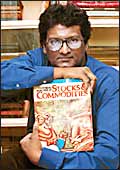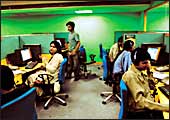 |
|
SWETA RAU
TRAINER
|
She
should've expected it. Thirty-year-old engineer Sweta Rau's parents
hit the ceiling when she decided to work as a temporary employee-a
'temp'-at NCR-Teradata in Mumbai. Was her career in crisis? She
had worked as a proper on-the-rolls employee with Wipro, IBM and
ICICI Infotech for seven years, with a brief US stint too, and now
this.
Rau, though, is cool about it. "I wanted
to enjoy life, and not look at it passing by," she says, happy
that she gets to earn money on her expertise while also playing
mother to her just-delivered baby. She'd be happy too if she could
keep it this way for the rest of her worklife. "I'm the kind
who never carries work home, and am completely off it once I step
out of office... being a temp lets me do that." Otherwise,
she complains, "In it, the work hours can be berserk."
Temping, adds Rau, is quite the done thing
in the US, and there's no need to chew nails as a temp in India
either. With so many short-term projects to go around, especially
in it, opportunities are expanding fast. According to one estimate,
some 25,000 temps are busy at work in India already, and with temp-placement
agencies in the fray, the figure is doubling every year.
Rau used Kelly Services. Arun Kumar Reuben,
29, an hr executive at Dr. Reddy's Labs, took a temp offer from
TeamLease, another temping firm. He has been with the firm for almost
18 months, doing a series of assignments, and is thankful for the
time he has got himself to "indulge in reading".
Technicolour Option
Companies working under rapidly changing business
conditions, of course, are thrilled by the idea of workforce flexibility:
it turns manpower into a variable rather than fixed cost. For firms
with turnkey projects, it's an ideal way to get work done. As in
showbiz: assemble a crew of talent, go into production, disband,
and reap rewards. Well, maybe not quite...
Yet, it's a good deal even for employees, avers
Iain Herbertson, Senior vp and MD, Asia Pacific, Manpower Inc. "Temping
gives those people access to work who otherwise would have none,"
he says, "Besides, it also enables one to upgrade and acquire
new skills."
It works best for the easily bored-people who
could possibly hold permanent jobs, but find frequent shifts a lot
more stimulating. Multiple job exposure could be quite enriching,
at times.
Ask K.R. Prabhakar, who was a permanent salesperson
for many years before signing up in December 2002 as a temporary
business development manager at a technology MNC, thanks to an offer
from Manpower. He is visibly happier now, and more enthusiastic
about his job than he has ever been. "New horizons get opened
all the time," he says, quite open to the idea of being a temp
for life, "I'd be bored to work in a sedentary job all my life.
As a temp, one gets to work in different locations and environments
on different jobs for various clients."
| Detached competence is the ruling philosophy
in templand. No one bothers about job security |
But then, adjusting to a new job every now
and then takes special skills too. "A temp needs the willingness
to create employability factors like the capacity and flexibility
to blend with different organisations on multiple projects they
work for," observes Ashok Reddy, MD, TeamLease. Resilience
and adaptability are key. Also, a temp must hit the high-productivity
curve right from day one, so if you're not enthusiastic about learning
new things, it's best to avoid temping. "There is no substitute
for a wide knowledge base and pleasing inter-personal skills,"
admits Prabhakar, "to adjust to new people without antagonising
them, and yet commanding respect for one's abilities."
Security Redefined
Job security, according to Sonal Thakur, a
temp group coordinator at a telecom firm in Delhi, is overrated.
Temping for some four years now, she has worked with three organisations,
and rates "freedom" much higher as a job attribute. What
about career-long loyalty? That's out, and everybody knows it. "Even
permanent employees are insecure," she quips. "I'd much
rather value the experience and exposure in top-notch companies.
What matters most is job satisfaction." And that's what Thakur
is out to get-wherever she can.
 |
SONAL THAKUR
GROUP CONSULTANT |
Reuben too says he doesn't bother with job security.
"I am too focused on achieving my goals to let feelings of
insecurity surface," he says, with an air of confidence. Similar
is the experience of Ranganath H.S., a temp at a Bangalore technology
unit. Job clarity is a big advantage as a temp. "It is your
work that is respected," says Ranganath, who doesn't get drawn
into any of the hierarchical intrigues and power games that permanent
employees devote so much energy to.
Detached competence is the ruling philosophy
in templand. It works. Since temps are clear about their short tenure,
they tend to feel less threatened by other employees. It might even
be the other way round, with permanent employees feeling the pressure
of temp performance.
Finer Motivations
Still, it is hard to believe that a company
would trust a temp with a job of truly critical importance. If not
'loyalty' in the dull old sense, what happens to 'commitment' to
an organisational mission? Is that being shortchanged?
Well, not all jobs need be relevant to an organisational
mission. Most of the attachments people develop, as Rau sees it,
tend to be comfort-zone oriented (familiar systems, co-worker companionship
and the like), not anything to do with the company's strategic intent
or market mission. Besides, a wise company would certainly want
to retain the rarer-than-rare temp who can actually contribute to
a long-term strategic goal.
SPOTLIGHT
Technical Analyst
 |
| Vivek Patil: Reading the stock market's
future |
Wouldn't
it be something to have investors hanging on to every utterance
of yours? Try it. Become a technical analyst of stock trading patterns.
It would make you a soothsayer, but of a statistical kind. It doesn't
call for any formal education, says Vivek Patil, a technical analyst
at ICICIDirect.com. "There aren't any courses that specifically
teach technical analysis in India," he says, "though most
MBA curricula have a section on the same, and the BSE has recently
started a two-day workshop to acquaint wannabes with the art."
The US, however, has the Chartered Market Technicians programme
which could be of use. You must, however, build a career-long reputation
for accuracy.
Get your trend-reading right, publicise your
predictions-and watch the response.
-Ananya Roy
COUNSELLING
Help, Tarun!
 I am a 28-year-old engineering graduate with a specialisation in
instrumentation. I completed my MBA in international business from
a top-rung B-school in Delhi two years back, and have been working
in the US as a marketing manager since then. However, my H1 B visa
expires in June 2005 and before that happens, I am planning to return
to India for good. What is the most opportune time to move to India
so I can optimise my chance of getting a good job, given that most
companies have a fixed recruitment schedule?
I am a 28-year-old engineering graduate with a specialisation in
instrumentation. I completed my MBA in international business from
a top-rung B-school in Delhi two years back, and have been working
in the US as a marketing manager since then. However, my H1 B visa
expires in June 2005 and before that happens, I am planning to return
to India for good. What is the most opportune time to move to India
so I can optimise my chance of getting a good job, given that most
companies have a fixed recruitment schedule?
The best way to do go about long distance job-hunting is to plan
your trip in advance and give about six weeks' notice to the employers
you are targeting. This way, they are sure that you have a visit
planned, and that you have made the effort to give them sufficient
notice in terms of appointments. Companies here usually recruit
around March/April, though that's the time people are busy with
campus interviews as well. So the best time for you to visit India
would be around the end of June or beginning of July when you could
get a few interviews scheduled. However, as I mentioned, you need
to begin correspondence a lot earlier.
I am a 40-year-old commerce graduate with
a degree in law. I have about 20 years of experience in handling
branch accounts, taxation and administration. I have been working
as a commercial executive with an FMCG company for the past five
years now. However, I feel I need to go in for further education
if I want my career to grow. What course should I opt for to maximise
my growth prospects in my present company or even to get a better
job elsewhere? Is it too late for me to go in for further education
given my age?
Age does make a difference, since employers
here have a misplaced notion that education should come early in
life. However, since you have taken a decision, one option for you
is to go in for a full-time MBA if you can afford to take two years
off. The other is to enroll yourself for an ICWA or a ca course.
If, however, you feel that taking a few years off from work would
not be possible, you could start looking for jobs where the skills
and experience that you have gathered over the years would come
in useful.
I am a 32-year-old major commissioned with
the Indian Army 11 years ago. Though I enjoy my work and have done
reasonably well throughout, I have now decided to quit the Army
and go in for a corporate job. I graduated in history from Delhi
University and did my executive MBA in international business from
a good B-school through correspondence, vide a facility accorded
to servicemen. I have also done a few courses in computers and have
adequate working knowledge of the same. What are my chances of getting
a good job and which industry would I fit in best?
Industry should not be a limitation for you
as you do not have prior work experience in a particular sector
anyway. The question you need to answer here is what industry would
you want to be in. You could be in administration or liaison, which
are traditionally functions that ex-servicemen tend to veer towards.
However, you are young and have an MBA degree behind you, so you
could also look into marketing, sales or exports. Decide where your
interests and skills lie and select the best company and function
accordingly.
I am a 23-year-old student pursuing BHMS
from a reputed university. I plan to do an MBA in marketing or a
specialised course in pharmacy once I complete my graduation. Which
one of the two would enhance my opportunities in the job market?
Or should I go in for some other course of study that will ensure
my getting a good job after I graduate? Please advise.
Career wise, an MBA will offer you more diverse
opportunities-you could still stay in the pharma industry if you
choose. Pharma sales would be a good function for a person with
your educational background. Doing a specialised course in pharmacy
will make you a specialist. The US market, for example, has great
demand and value for such specialists. In India, however, an MBA
would give you more flexibility at the moment, unless you are committed
to pharma research or something similar. If you do not want to get
into research, an MBA would be the best bet for you.
Answers to your career concerns are contributed
by Tarun Sheth (Senior Consultant) and Shilpa Sheth (Managing
Partner, US practice) of HR firm, Shilputsi Consultants. Write to
Help,Tarun! c/o Business Today, Videocon Tower, Fifth Floor, E-1,
Jhandewalan Extn., New Delhi-110055.
Personalised
Workspace
Just how much can you
do up your workspace?
 |
| Think creative?: Bizarre
decor could fertilise your mind some |
Liberty-is
that a 'limited resource'? That's what you might hear in the ad
business, where it's bland spaces that raise eyebrows. Ram Jayaraman,
senior copywriter at JWT, is doing okay; he has a charpoy bang in
the middle of his cabin-in case he needs a nap. There's also a skeleton
hanging from the ceiling, 'Orgasm Donor' imprinted helpfully on
the skull (don't ask). "We are creative people, and apart from
nudity and vulgarity as a fallout, we are allowed anything that
makes us feel comfortable," says Jayaraman alias Ram Cobain.
At Adobe Systems' office in Noida, you have
to tiptoe around a tent to avoid disturbing software quality manager
Nandan Jha's chain-if that's the word-of thought. "He likes
it that way, so be it," shrugs Vivek Tripathi, Senior Manager
(hr), Adobe Systems.
Is this the new corporate culture? "No,"
says S.P. Raheja, hr consultant and CEO of Fast Track, "Most
companies have a blue book on office ethics. The hr at Jagatjit
Industries, for example, stepped in when an employee started doing
puja with agarbattis et al in office." Oh so where does a company
draw the line? So long as no offense or discomfort is caused to
others, "we allow almost everything", says Tripathi.
-Ananya Roy
The
Hot Five
The five hot sectors
for the job you want.
 |
| IT rules: India's forever
hot sector needs you |
You
know a sector is hot when long lost relatives get in touch to get
the jobs lowdown on it. By that not-so-scientific yardstick, these
would be the hottest five in India for the moment.
»
Information Technology (IT) is India's perennially
hot sector, with digi-dollars being earned in ever greater orders
of magnitude.
»
Information Technology Enabled Services (ITEs),
or good old call centres, could take in 1.5 lakh people over six
months, by one StantonChase estimate.
»
Retail is booming still, with a thousand malls
set to bloom. Trained manpower would be needed to get sales jingling
too.
»
Auto and auto ancillaries would need recruits
in diverse functions, with more and more wheels hitting the tar.
»
FMCG is showing signs of overcoming its growth
pangs, as the challenge of 'vibing with the consumer' promises hot
careers to the passionate.
-Payal Sethi
|
